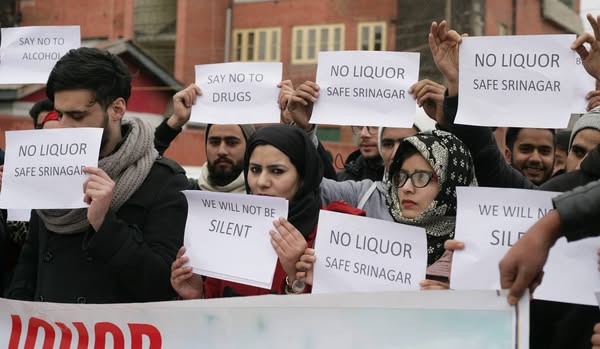Three Bills and a Public Campaign: Why the Valley is Seeing Growing Calls for a Liquor Ban
Srinagar 01 March 2025: Ahead of the Jammu and Kashmir Assembly’s Budget Session starting on March 3, calls for a liquor ban have been growing stronger in the Union Territory. This movement is driven by concerns over rising drug addiction and social media posts showing apparently drunk tourists, which have added to the public’s worries. However, the debate is complex, as the region also benefits from rising revenues from excise and tourism.
Bills for a Liquor Ban:
Three private member Bills aimed at a liquor ban have been submitted to the Assembly Secretariat for introduction in the coming session. Peoples Democratic Party (PDP) MLA Fayaz Ahmad was the first to submit a Bill to “prohibit the advertisement, sale, purchase, consumption, and manufacture of alcoholic drinks in the State of Jammu and Kashmir.” National Conference (NC) MLA Ahsan Pardesi and Independent legislator Sheikh Khurshid Ahmad followed suit.
Substance Abuse Crisis:
The Bills come amidst a substance abuse and addiction crisis in J&K. In 2023, reports highlighted that “one addict walks into Srinagar OPD every 12 minutes,” with the then J&K DGP describing the crisis as “a bigger threat than militancy”. While the sale and consumption of liquor is not banned in J&K, its public consumption has always been considered taboo in the Valley.
Public Outrage and Social Media:
Recent social media posts showing apparently drunk tourists on Kashmir streets have created outrage in some quarters in the Valley. This led to a decision by traders at Srinagar’s Lal Chowk to display signboards urging tourists not to consume alcohol and drugs in public. The police move to take down these signboards received backlash from the public as well as Valley-based parties.
PDP’s Campaign:
Along with the Bill moved by its MLA, the PDP has launched a signature campaign to garner public support for a liquor ban. Iltija Mufti, the media advisor to party president Mehbooba Mufti, stated, “There are multiple videos of inebriated tourists. There was one where they were peeing in the Dal lake. This is not just about alcohol. It is also about respecting basic societal norms and etiquettes”. She added that if Gujarat can be declared a dry state, the logic is even stronger for a Muslim-majority region like J&K.
Revenue Concerns:
The NC-led government under Omar Abdullah has been treading carefully on the issue, partly due to revenue concerns. Liquor sales saw a rise from Rs 1,353 crore in 2020 to Rs 2,486 crore in 2024, adding substantially to J&K’s coffers. NC chief spokesperson Tanvir Sadiq mentioned that several factors need to be considered when deciding on a policy change of this scale, including the impact on tourism.
Tourism and Excise Revenue:
The debate over a liquor ban also involves the potential impact on tourism and excise revenue. Alcohol prohibition can lead to significant losses for industries like tourism, as seen in other states like Gujarat and Bihar. The tourism sector has multiple interlinkages with other industries such as food services, hospitality, retail, and real estate. Therefore, a liquor ban could have spillover effects on these sectors.
Bottom-Line:
The growing calls for a liquor ban in Jammu and Kashmir reflect a complex interplay of social, economic, and cultural factors. While concerns over substance abuse and public behavior drive the movement, the potential impact on revenue and tourism presents a significant challenge. As the debate continues, it remains to be seen how the region will navigate these competing interests.




